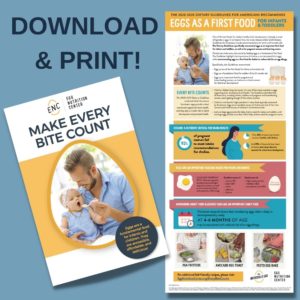At the Egg Nutrition Center, we commend Healthcare Professionals (HCPs) and their unwavering commitment to science as they make practical recommendations to their patients and clients. Staying abreast of current evidence is critical as HCPs craft their guidance and education.
In order to help HCPs offer their patients and clients comprehensive information on eggs as a first food for growth and development, allergy risk reduction, and feeding tips, we created “Make Every Bite Count” booklets (download here) and a poster (download here) that can be printed and shared. Why is this information important to share with parents and caregivers? Keep reading!

The newly released 2020-2025 Dietary Guidelines for Americans include recommendations for birth to 24 months old, and specifically recommend eggs as an important first food for infants and toddlers, as well as for pregnant women and lactating moms.1 This historic recommendation, coupled with the evolving evidence about infant feeding and allergen guidance from the American Academy of Pediatrics, arms practitioners with a clear message, “Parents can make every bite count by feeding eggs as a fundamental first food.”
In 2019, the American Academy of Pediatrics (AAP) updated their policy on the introduction of potentially allergenic complementary foods. Feeding common food allergens, such as eggs, when a baby is developmentally ready (between 4-6 months) may actually reduce the chances of developing an allergy to that food.2
Additionally, in their 2018 policy statement advocating for improving nutrition in the first 1,000 days, the AAP stated: “Although all nutrients are necessary for brain growth, key nutrients that support neurodevelopment include protein; zinc; iron; choline; folate; iodine; vitamins A, D, B6, and B12; and long-chain polyunsaturated fatty acids. Failure to provide key nutrients during this critical period of brain development may result in lifelong deficits in brain function despite subsequent nutrient repletion.”3
Eggs are affordable, accessible, and versatile. Eggs contain various amounts of all the nutrients listed by the AAP as essential for brain growth, including being an excellent source of choline, which plays a vital role in neurocognition during the first 1,000 days of life. With 90% of brain growth happening before kindergarten, eggs help make every bite count, especially when babies are just being introduced to solid foods. These recommendations confirm what the science has shown: eggs provide critical nutritional support for brain health, and they play a crucial role in infant development and prenatal health. Just one large egg provides the daily choline needs for babies and toddlers, and two large eggs provide more than half of daily choline needs for lactating moms.
Eggs are a nutrient-dense powerhouse. They provide an excellent source of vitamin B12, biotin, iodine, selenium, and choline; a good source of high-quality protein, riboflavin, and pantothenic acid; as well as the carotenoids lutein and zeaxanthin.4
For more information and shareable handouts, videos, and more visit our materials page.
References
- U.S. Department of Health and Human Services and U.S. Department of Agriculture. 2020-2025 Dietary Guidelines for Americans. 9th Edition. December 2020.
- Greer, F.R., S.H. Sicherer, and A.W. Burks, The Effects of Early Nutritional Interventions on the Development of Atopic Disease in Infants and Children: The Role of Maternal Dietary Restriction, Breastfeeding, Hydrolyzed Formulas, and Timing of Introduction of Allergenic Complementary Foods. Pediatrics, 2019. 143(4).
- Schwarzenberg SJ, Georgieff MK. Advocacy for Improving Nutrition in the First 1000 Days to Support Childhood Development and Adult Health. Pediatrics, 2018. 141(2)
- U.S. Department of Agriculture and Agricultural Research Service. FoodData Central. 2019; Available from: https://fdc.nal.usda.gov/index.html.

